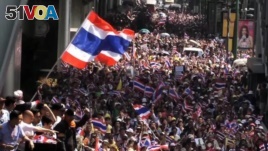January 09,2014
BANGKOK — The Thai government led by Prime Minister Yingluck Shinawatra is pressing ahead with nationwide elections on February 2, despite a boycott by the main opposition Democrat Party. Street protests are expected to increase as demonstrators demand the polls be delayed.
Thailand’s ruling Pheu Thai Party hopes the February elections return them to office with an even bigger majority. The campaign slogan “Respect My Vote” is a rebuttal to the anti-government demonstrators who succeeded in blocking candidates from registering in 28 districts.

Nevertheless, the party is widely expected to regain its majority in parliament, partly because of populist policies that have benefited its backers, especially in northern rural areas.
In the capital however, tens of thousands of mainly urban middle class Thais are hoping to stop the polls by occupying key parts of the city.
Suranand Vejjajiva, secretary general to the prime minister, says holding the polls will ensure Thai democracy moves forward.
"If there's no election I think conflict and confrontation will intensify and it could lead to more violence which I don't think anyone in Thailand or even in the international community would like to see," he said.
The street protests began after Prime Minister Yingluck Shinawatra's government backed an amnesty bill that could have allowed her older brother, Thaksin Shinawatra, to avoid a jail term for corruption and return to Thailand.
Yingluck called for new elections, but protesters and the opposition Democrat Party, who cannot match the political strength of Pheu Thai, demanded the government be replaced by a non-elected reform council.
Protest leader and former lawmaker Suthep Thaugsuban argues that step will make Thailand more transparent and democratic.
“Our main aim is to reform Thailand to make the election clean, without any corruption without any vote buying and we want to elect representatives that will truly represent the people,” he said.
The anti-government movement aims to “shut down” Bangkok from January 13 to pressure the government to resign.
Analysts and the Thai military are warning of growing violence.
Thitinan Pongsudhirak, a political scientist at Chulalongkorn University, fears the election will fail to solve Thailand's political crisis.
"The polls on February 2 are going to be part of the crisis more than part of the resolution because if they don't take place, the pro-election side will be unhappy," he said. "But if they do take place, there will be all kinds of mayhem from the other side and controversy from the anti-government side.
More than 50 parties are contesting the February second vote, led by Prime Minister Yingluck's Pheu Thai party. But with massive protests scheduled for the capital in the coming days it will prove a vital test for Thailand's democracy.